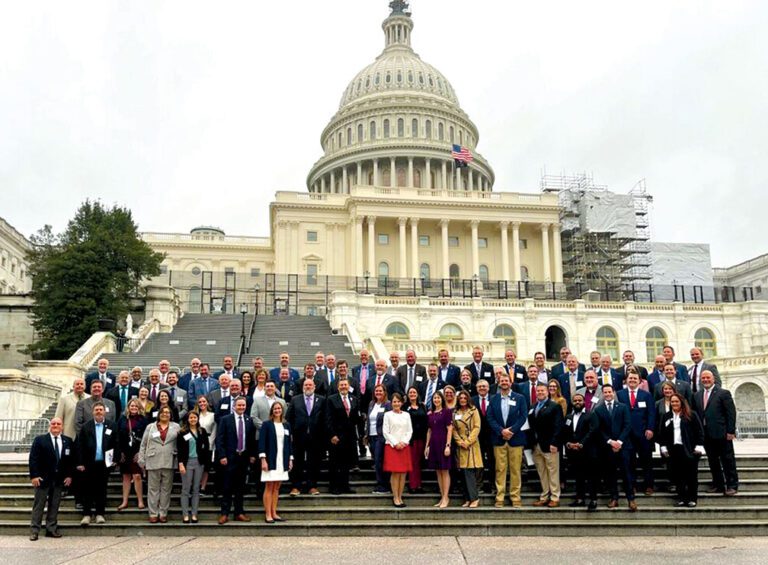Nearly 100 Truckload Carrier Association (TCA) members and staff attended the organization’s annual Call on Washington September 25-26, 2023, to meet with the nation’s lawmakers regarding several major issues facing the trucking industry.
Thirty-five motor carriers, including representatives of six Canadian fleets, were represented at the event. In total, the TCA contingent included representatives from 29 U.S. states and Canada.
TCA’s annual Call on Washington is a special event, said David Heller, the association’s senior vice president of safety and government affairs.
“(TCA is) acting as the voice of the truckload segment of the motor carrier industry, and you can never have enough people talking about our industry. Our members are shaping the legislation and regulations that define their businesses, Heller noted.
“This is the most successful Call on Washington our association has had, with over 80 members who participated,” he said of this year’s event. “With our members engaging directly with our policymakers, we ensure our industry’s concerns are being heard and understood.”
The group was busy during the two-day visit, according to Hailey Betham, TCA’s manager of government affairs.
A total of 78 face-to-face meetings were held with 29 senators and 49 representatives. TCA members and staff had a chance to meet with members of the House Committee on Transportation and Infrastructure; the House Committee on Energy and Commerce; the Senate Committee on Commerce, Science and Transportation; and the Senate Committee on Environment and Public Works.
Members met with Sen. Ted Cruz (R-TX), who is the ranking member of the Senate Committee. Members also met with Ranking Member Rep. Rick Larsen (D-WA). TCA member Scott Manthey, a resident of Washington state, received a personal invitation from Larsen’s staff.
Congressional leaders who sat down with TCA members to discuss trucking issues also included Sen. John Boozman (R-AR), Sen. Markwayne Mullin (R-OK), Rep. Kelly Armstrong (R-ND), Rep. Eric Burlison (R-MO), Rep. Buddy Carter (R-GA), Rep. Mike Collins (R-GA), Rep. Brett Guthrie (R-KY), Rep. Brian Mast (R-FL), Rep. Bruce Westerman (R-AR), and Rep. Bob Latta (R-OH).
One of the top issues discussed was the Truck Parking Improvement Act, known In the House as H.R. 2367 and in the senate as S. 1034. TCA members asked their representatives to co-sponsor these bills if they had not done so. As a result of these meetings, Illinois Sens. Dick Durbin and Tammy Duckworth, both Democrats, are now co-sponsors of S. 1034.
In addition to TCA’s efforts to address the issue of truck parking, two safety organizations have written a letter of support to Congress regarding the Truck Parking Safety Improvement Act. On October 2, 2023, the Institute for Safer Trucking and Road Safe America sent a joint letter in favor of the proposed legislation.
“As organizations committed to promoting truck safety, we are writing to express our strong support for the Truck Parking Safety Improvement Act,” the letter states. “We believe that this legislation is an important step toward improving the safety and well-being of commercial truck drivers, as well as other road users.”
Earlier this year, on May 23, the House Committee on Transportation and Infrastructure passed an amended version of the act by a vote of 60-4. In a statement issued shortly after the vote, TCA said the vote was a “positive outcome” and “represents a significant step forward in enhancing driver safety, ensuring compliance with federal regulations and improving the operational efficiency of the trucking industry.”
Currently, the trucking industry is facing a critical shortage of parking spaces, with a ratio of just one parking spot for every 11 drivers, according to the TCA.
“This legislation highlights the Committee’s dedication to resolving the persistent challenge of truck parking shortages, which have long posed safety risks and hindered the productivity of supply chains,” the TCA said in its statement. “Adequate truck parking facilities allow drivers to take necessary rest breaks, comply with federal Hours of Service regulations, and effectively manage their schedules, leading to increased efficiency and improved road safety for all.”
Another topic of discussion between TCA members and lawmakers is the repeal of the federal excise tax, or FET, on the purchase of new equipment. The new truck excise tax is currently the highest percentage excise tax — at 12% — levied on any product.
Sen. Ben Cardin (D-MD), who supports repealing the FET, said previously this year that “the current federal excise tax has become a barrier to our progress in encouraging cleaner and greener technology. I am proud to support tax policy that enables Maryland manufacturers to innovate and deploy cleaner and safer technologies in our trucking industry. Our legislation will spur growth and competitiveness while making our roads safer and less polluted.”
Betham, who joined the TCA team just this fall, told Truckload Authority she believes this year’s Call on Washington was very successful.
“Coming into this role, my goal was to have TCA make more of an impact on Capitol Hill,” she said. “To achieve that, I wanted to have at least 75 scheduled meetings with our members of Congress. I am proud to say that we surpassed that goal and had 78 scheduled meetings — 29 more meetings than last year’s Call on Washington.”
This article originally appeared in the November/December 2023 edition of Truckload Authority, the official publication of the Truckload Carriers Association.
Linda Garner-Bunch has been with The Trucker since 2020, picking up the reins as managing editor in 2022. Linda has nearly 40 years of experience in the publishing industry, covering topics from the trucking and automotive industry to employment, real estate, home decor, crafts, cooking, weddings, high school sports — you name it, she’s written about it. She is also an experienced photographer, designer and copy editor who has a heartfelt love for the trucking industry, from the driver’s seat to the C-suite.















